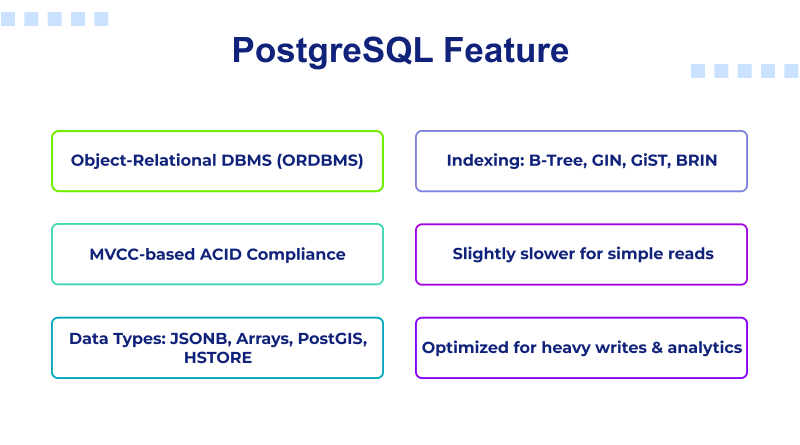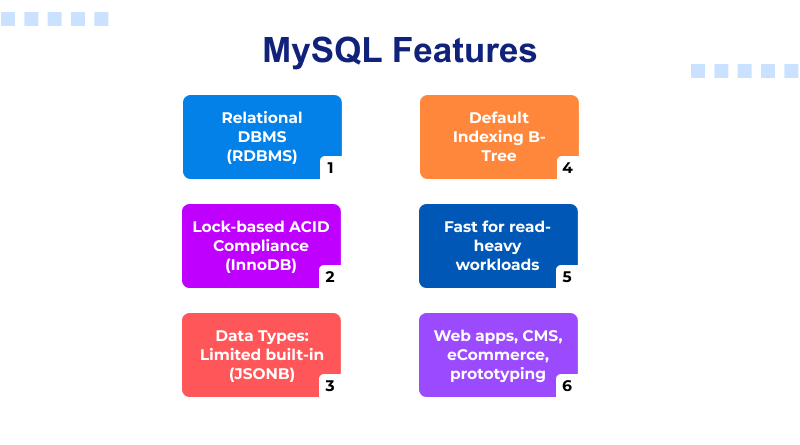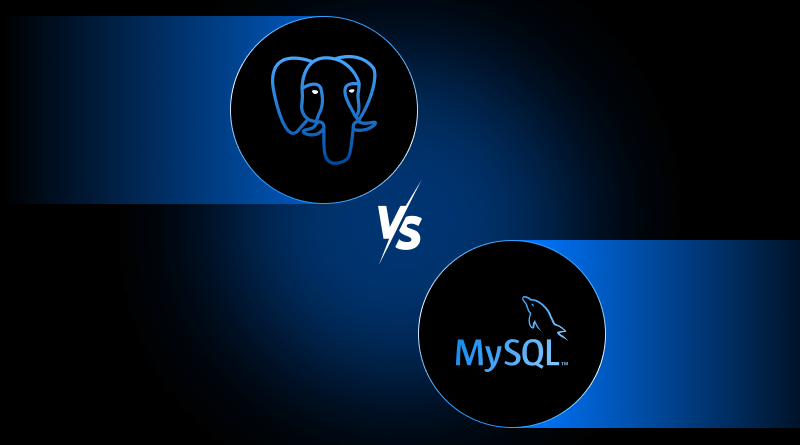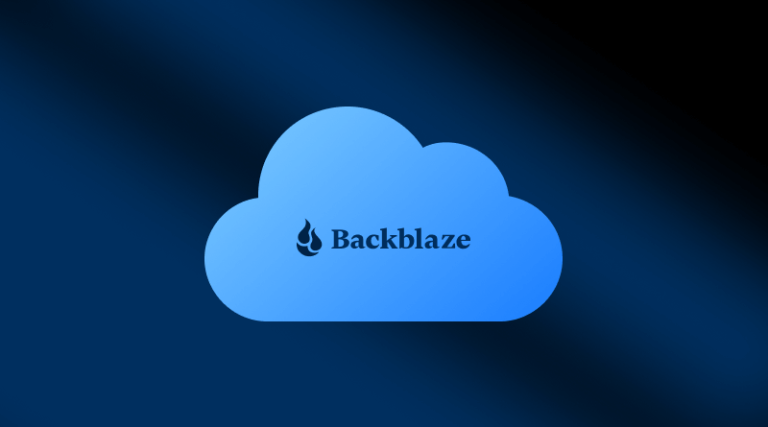When it comes to contemporary application development, the PostgreSQL vs MySQL debate perpetuates confusion. Each database is powerful, open-source, and predominant in primary developer communities. However, there seems to be an equal division in the preference for the two systems.
Both have similar characteristics, each system stores data in tables and applications, supports SQL, and handles millions of web applications. However, the differences between PostgreSQL hosting and MySQL hosting include the way each handles scale, and the complexity of systems under pressure.
MySQL is marketed as a user-friendly, fastest, and simplest of the user systems, so it is most often used for web development (employed by beginners). PostgreSQL is known for advanced features and management. It is used for high-data oriented and developed enterprise applications.
In this blog, we will analyze PostgreSQL vs. MySQL debate along with performance, scale, and features to help determine which system aligns best with the overarching goals and needs of your project.
Table Of Content
Core Architecture: RDBMS vs. ORDBMS
To begin with, MySQL and PostgreSQL differ in relational data interpretation and management. MySQL is a classical Relational Database Management System (RDBMS). It is designed for structured data with uncomplicated relationships between tables. It is simple, fast, and reliable, which is the reason it drives a huge multitude of web-based applications.
PostgreSQL, on the other hand, is an enhanced Object-Relational Database Management System (ORDBMS). This means it combines relational integrity with other object-oriented aspects like table inheritance, user-defined data types, and sophisticated indexing techniques. This allows developers to craft intricate, reusable data structures and frictionlessly manage a variety of workloads.
Also Read: Data Types in PostgreSQL: Different Examples and Categories
Overall, MySQL is more about efficiency and accessibility, while PostgreSQL is about flexibility and extensibility. This is an important distinction to make, especially as applications grow in size and complexity.


PostgreSQL vs MySQL Comparison: Feature-by-Feature
For PostgreSQL hosting and MySQL, most developers make decisions based on the expected performance and reliability. Although both systems share SQL as a base, they significantly differ in transaction handling, data integrity, and extensibility. Here are some of the key features that distinguish the two systems.
Also Read: Managed vs. Unmanaged PostgreSQL Hosting
Key Differences Between PostgreSQL and MySQL
| Feature | PostgreSQL | MySQL |
| Database Type | Object-Relational DBMS (ORDBMS) | Relational DBMS (RDBMS) |
| ACID Compliance | Native, MVCC-based, strong concurrency | Engine-dependent (InnoDB), lock-based |
| Data Types | Advanced types: JSONB, Arrays, PostGIS, HSTORE | Limited built-in types, JSON supported |
| Indexing | B-Tree, GIN, GiST, BRIN | B-Tree (primary/default) |
| Read Performance | Slightly slower for simple reads | Fast for read-heavy workloads |
| Write/Complex Queries | Excellent, optimized for heavy writes & analytics | Moderate, can face bottlenecks |
| Extensibility | Highly extensible, custom data types & functions | Limited extensions |
| Security Features | Role-based access, granular permissions | Requires extra configuration for enterprise-grade security |
| Ideal Use Case | Data-intensive, complex apps, high concurrency | Web apps, CMS, eCommerce, prototyping |
1. PostgreSQL vs. MySQL: Data Integrity (ACID & Concurrency)
Every transaction in both MySQL and PostgreSQL qualifies as ACID-compliant; thus, every transaction possesses Atomicity, Consistency, Isolation, and Durability. The methodologies, however, differ significantly.
With PostgreSQL, there’s a native implementation of Multi-Version Concurrency Control (MVCC), meaning resources don’t have to be locked as users simultaneously read and write entries. To PostgreSQL’s credit, there’s no weak link in performance, even during concurrent PostgreSQL-intensive tasks. PostgreSQL also handles high transaction volumes without redundant processing in a contention system, something MySQL struggles to do during horizontal scaling.
This creates a performance edge for PostgreSQL in complex transactional & high-volume systems where interdependent transactions require concurrent processing.
2. PostgreSQL vs. MySQL: Data Types & Extensibility
Advanced data types and extensibility are among the most articulated attributes PostgreSQL has over MySQL. PostgreSQL captures data beyond rudimentary relational entries and implements advanced data types, and also supports complex structures like:
- Using JSON and JSONB is helpful for saving and querying semi-structured data in an efficient manner.
- Arrays, HStore, and UUID data types provide flexibility in modeling data and enable various uses.
- PostGIS is an extension for handling geospatial data and performing geographic queries.
PostgreSQL has all these features and more. It has a customizable architecture and allows the definition of new data types, new operators, and new functions so that developers can tailor a specific solution for a given application.
MySQL, in comparison, has a fairly limited set of data types and requires the use of plugins for extended functionality. This ease of use is, needless to say, a double-edged sword! For analytics, AI, location services, and other modern applications, pegging the right data structures to evolving use cases is crucial.
3. PostgreSQL vs. MySQL: Indexing and Query Optimization
In all the dimensions of a database, indexing is the most basic and crucial to database performance. PostgreSQL has additional indexing options. The database also offers flexibility with indexing types. It supports B-Tree, Hash, GIN, GiST, and BRIN. Each indexing type is tailored to specific query patterns. For instance, GIN indexes speed up full-text searches and JSONB queries, while GiST enables spatial and range queries.
MySQL has more limited support for specialized indexing and uses B-Trees for general-purpose indexing. B-Trees are appropriate for advanced and complex filtering queries. B-Trees are more limited for more advanced data types and complex filtering, so more complex queries will need advanced data types.
4. PostgreSQL vs. MySQL: Speed vs. Reliability
In the competition for performance between PostgreSQL and MySQL, one must consider the operational contexts. It is not simply a question of speed but the constellation of performance, reliability, and the nature of the workload for the operational context.
MySQL is more appropriate for applications involving predominantly read operations. It is able to process read operations more quickly due to its thread-based architecture and lightweight execution engine, which improves the efficiency for simple read queries. MySQL is also suitable for high-traffic web applications, content-heavy websites, and e-commerce platforms.
5. PostgreSQL vs. MySQL: Advanced Write Query Analysi
Regarding writing queries and complicated analytics, PostgreSQL performs better than MySQL because of Multi-Version Concurrency Control, which allows PostgreSQL to perform concurrent writes and not lock the rows when updating. This makes it easier to remain compliant with the ACID standards.
PostgreSQL has better query planners and optimizers, which allow it to manage nested subqueries, CTEs, and JOIN-rich queries. Enterprise-level analytical queries are also tailored to PostgreSQL because it deals effectively with complex data types, including JSONB, hstore, relational, and spatial data, and several other types.
6. PostgreSQL vs. MySQL: Concurrency and Scalability
PostgreSQL’s ability to perform concurrent transactions on several sessions and multiple users performing read and write operations concurrently with little contention is better than MySQL’s. PostgreSQL is better suited for real-time applications. This is because it handles concurrent transactions better than the InnoDB storage engine, which handles ACID transactions, making PostgreSQL the better-suited database for applications, financial systems, and other data-centric systems that require higher data availability and integrity.
Although MySQL is scalable, managing similar levels of concurrent workload often entails additional adjustments with replication and caching systems (like Memcached or Redis). This strategy may heighten complexity and cost.
PostgreSQL vs. MySQL: Which One to Choose?
With respect to the difference between PostgreSQL and MySQL, it ultimately comes down to the requirements of your application. Is it speed and ease, or depth and robustness? Both systems of record have advanced to powerful systems, but they still have distinctly different purposes when deployed.
- Select MySQL where:
MySQL performs best in highly simplistic environments with an emphasis on numerous read operations. This is also the primary database of choice for developers working on LAMP or LEMP stack applications, as well as read-centric eCommerce platforms and content management systems (WordPress, Joomla, Drupal). Its lightweight design, speed of query execution, and simplicity of installation make it ideal for rapid development and cost-constrained projects.
- Select MySQL where:
MySQL is usually the best, quickest option when developers require a system that functions well on its own without advanced database adjustments or elaborate settings.
PostgreSQL excels in its capabilities and architecture, and for complex and advanced data, while MySQL is the clear value for speed, simplicity of applications, and deployment, which is why it is mostly preferred by web developers and startups. MySQL is simpler and faster to deploy than PostgreSQL, which is why it is preferred for faster and simpler projects.
In contrast, PostgreSQL is preferred for powerful architecture, data integrity, and advanced functionalities. Most importantly, data-heavy, scalable, and enterprise applications utilize PostgreSQL.
There is no one ideal database. It is all contingent on the performance requirements, the complexity of the data, and the projection of the project for the years to come.
FAQs
1. Is PostgreSQL faster than MySQL?
It depends on the type of workload. MySQL is typically faster on simpler, read-heavy tasks due to its lightweight architecture, which is primarily thread-based. For complex queries, concurrent writes, and data-intensive applications, PostgreSQL is superior due to its MVCC and advanced query optimizer.
2. Can I switch from MySQL to PostgreSQL easily?
It can be done, but it requires some planning. Tools such as pgLoader and custom scripts work fine for data, tables, and schema migrations. Most of the time, some adjustments are unavoidable because of the differences in SQL, data types, and indexing.
3. Which one is more secure—PostgreSQL or MySQL?
If configured properly, both are secure. PostgreSQL, however, has better default secure settings. These include more robust role-based access, hierarchical permissions, more granular access controls, and stricter ACID compliance. While MySQL also adheres to security best practices, it appears to place the responsibility for security on the user, requiring additional configuration for enterprise-grade protection.
4. Do both PostgreSQL and MySQL support JSON data?
Yes, both databases support JSON. PostgreSQL’s JSONB, a JSON type in binary format, is optimized for indexing and querying, so it is the clear winner in complex JSON operations. MySQL’s support for JSON is more limited in indexing and query capabilities compared to PostgreSQL.
5. What are the fundamental differences between PostgreSQL and MySQL?
PostgreSQL is an ORDBMS, meaning it provides advanced data types, MVCC concurrency, and complex indexing. MySQL is a pure RDBMS, meaning it does not provide those advanced features. Your decision should be based on what features matter the most to your use case.














